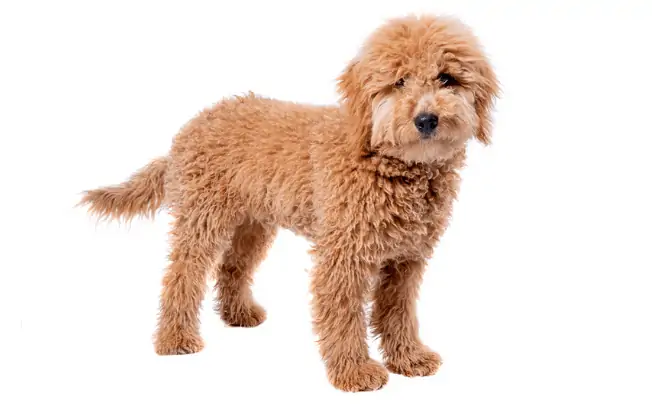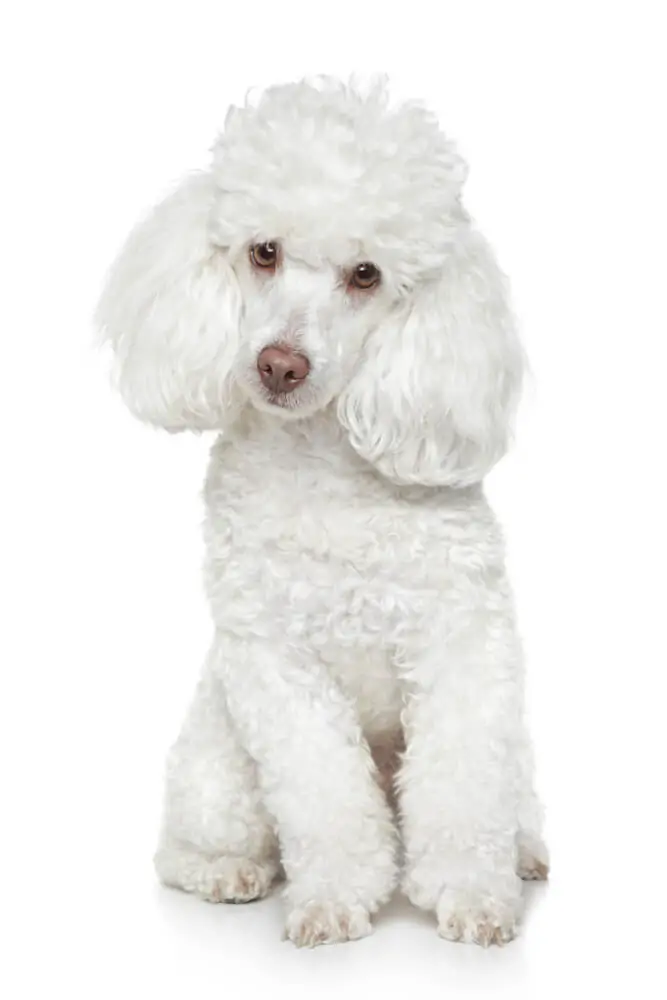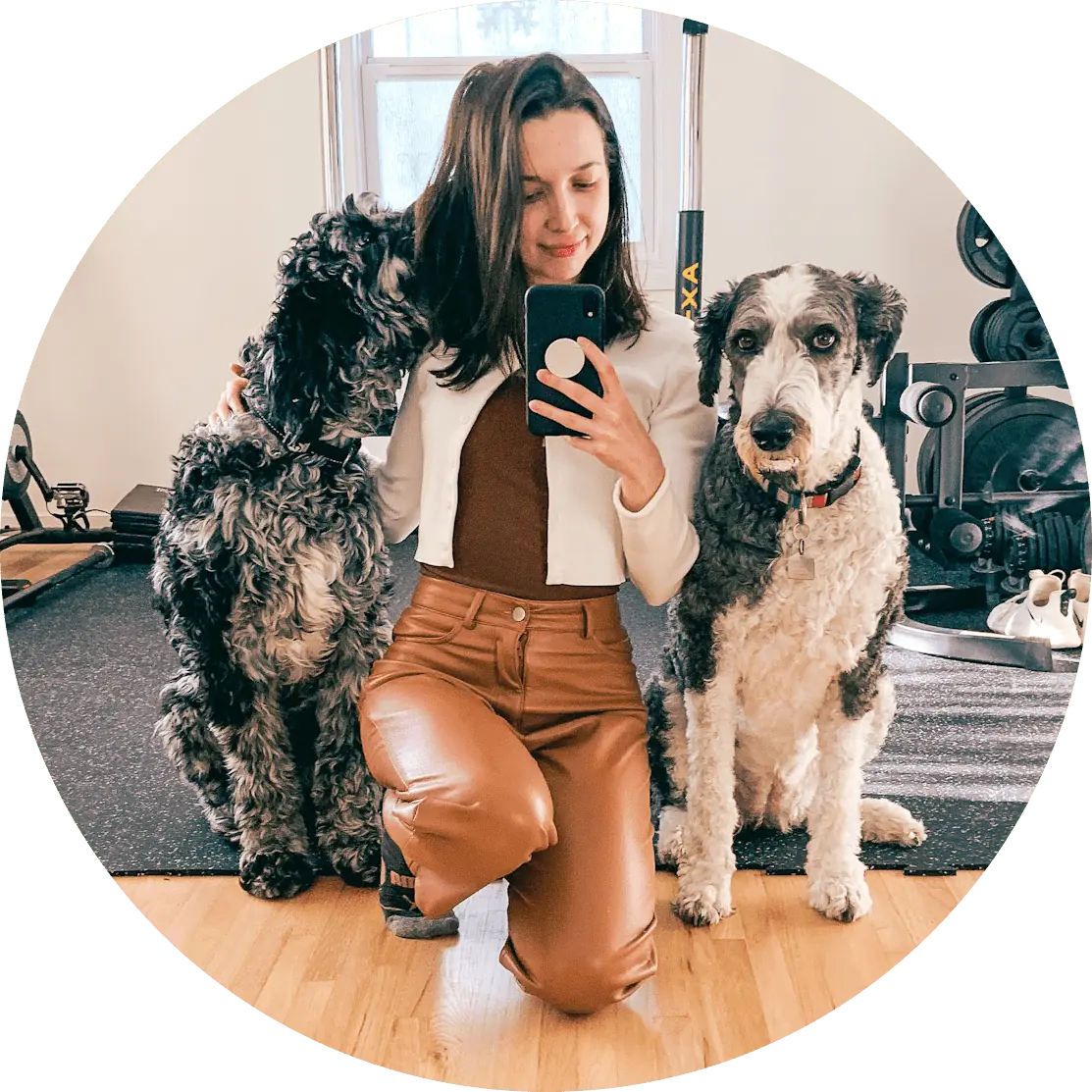Last Updated on
If you’re in search of a small dog that doesn’t shed much, look no further than the Teacup Goldendoodle. In this article, you’ll learn everything you need to know about this miniature pup.
We’re also playing devil’s advocate to tell you why you shouldn’t get a teacup Goldendoodle (don’t worry, there are plenty of other small Doodle dogs you might consider if a Teacup Goldendoodle isn’t right for you).
Let’s jump in.
| Teacup Goldendoodle Quick Facts | |
| Weight | 7 to 13 pounds |
| Height | 8 to 13 inches tall |
| Temperament | Docile, playful, intelligent, loyal |
| Colors | Golden, black, gray, red, copper, apricot, red, white. |
What Is a Teacup Goldendoodle?
Teacup Goldendoodes (1) are a mix between a Golden Retriever and a Toy Poodle. They’re the smallest of the Goldendoodle family and can be challenging to find due to their popularity and high demand.

The earliest Teacup Goldendoodle, also known as a Toy Goldendoodle, came about in the 1990s, which makes it a relatively new breed (in the grand scheme of things). Due to its cute teddy bear looks and excellent temperament, the popularity of this breed has been increasing in recent years.
The Teacup Goldendoodle looks just like the original Goldendoodle, yet is of a much smaller (teacup) size, hence the name. This miniature dog may be more desirable for some people, especially if you are looking for a mini-sized dog fit to live in a small home or apartment.
Teacup Goldendoodles can come in a variety of different generations, including F1, F2, and F1b:
- F1 Teacup Goldendoodles: A Teacup Poodle bred with a Golden Retriever
- F2 Teacup Goldendoodles: Two Teacup Goldendoodles bred together
- F1b Teacup Goldendoodles: A Teacup Goldendoodle bred with a Teacup Poodle
Size of Teacup Goldendoodles
Unlike Mini Goldendoodles, which weigh 15-35 pounds, Teacup Goldendoodles tend to be even smaller! Teacup Goldendoodles weigh between 7 to 13 pounds. As for height, these tiny dogs will stand from around 8 to 13 inches tall at the shoulder once they reach their full growth.
Colors And Coat Types
You can get Teacup Goldendoodles in many different colors, which include black, gray, red, copper, apricot, red, white, but most commonly golden. Sometimes you might find that your Toy Goldendoodle has some white markings or splotches on his or her body as well.
When it comes to the coat of a Teacup Goldendoodle, these dogs can come in four different coat types. These include flat, straight, wavy, and curly, but the last two are by far the most common.
Grooming
There are plenty of Goldendoodle haircuts and styles to keep your pooch looking their best.
The grooming of a Toy Goldendoodle with a straight or flat coat is easy and doesn’t take up too much of your time when done regularly. This is because their fur is closer to that of the Golden Retriever than that of the poodle.
Goldendoodles with these coat types do shed, and you will need to brush them around one or two times a week to make sure you keep this shedding under control. This is especially important during shedding season, when your dog will ‘blow’ their coat, and they’ll lose more fur than normal.
On the other hand, grooming of the wavy or curly Teacup Goldendoodle, which is the most commonly occurring and popular type of coat, is a lot different.
Wavy and curly Goldendoodles have hair and usually don’t shed much, yet need daily grooming. This is necessary to prevent knots and matting from forming in your dog’s hair.
If you don’t brush the coat of your Goldendoodle on a daily basis, it can then become much harder to deal with these knots, and matting can even get out of control.
The best tool for grooming your Teacup Goldendoodle is a slicker brush, as well as a grooming rake (for wavy coats) or a metal comb (for curly coats). You can also use a pet coat detangling spray to help with the grooming process and make it faster and easier.
Teacup Goldendoodle Personality And Temperament
To understand the personality of the Teacup Goldendoodle, let’s look at both parent breeds!
Golden Retriever

Golden Retrievers are friendly, affectionate, and even-tempered. These dogs are active and as a result, will require quite a lot of daily exercise. Their fun-loving and playful nature makes for a great playmate and companion for children.
Golden Retrievers are highly intelligent and attentive, which means they are easy to train a large number of different skills. They are also very obedient and trustworthy.
Golden Retrievers get along great with other dogs and pets and are used for a variety of jobs, including as therapy dogs and service dogs.
Toy Poodle

Toy Poodles are loyal and get closely attached to their owner or family. Originally bred for companionship and mushroom hunting, the Toy Poodle loves getting attention and spending time with you. As they were also bred to hunt, they’ll enjoy nose work games that make them search and sniff.
This breed is fun-loving and playful, and their active nature requires you to provide them with enough physical activity every day.
They are also highly alert dogs and will quickly let their owners know if they sense or spot a potential threat.
Teacup Goldendoodle
The Teacup Goldendoodle combines the docile, playful nature of the Golden Retriever and the smartness and loyalty of the Toy Poodle, giving you a bit of both worlds.
Loyal
Like the Poodle, Toy Goldendoodles are loyal and will want to stick by their owner’s side. As a result, they may develop separation anxiety, so you should take proper precautions and socialize them properly as a puppy.
This could mean leaving your house for short amounts of time and gradually working up to longer durations. This way, your pup will get used to being away from them and may not be as anxious when you leave.
When you arrive home, don’t act too excited to see your dog, otherwise, they’ll think that it’s a big deal when you come and go, and could get more anxious when you leave the house.
Intelligent
Due to their parent breeds, Toy Goldendoodles are very intelligent. They’re easy to train and love to take part in mental enrichment games like puzzles, nose work, and obedience training.
Affectionate
These little dogs are fun-loving, gentle, sweet, and very affectionate to their owner or family, and will become very attached to them.
They also get along great with children and other pets in your household. However, you have to make sure that if you have small children, they understand how to behave around dogs so they don’t accidentally hurt the dog.
Stubborn
Even though Golden Retrievers are extremely obedient and attentive dogs, Poodles sometimes act rather stubbornly. As a result, this genetic trait happens to be present in the Toy Goldendoodle as well, and you may need extra patients with training.
Friendly
The Teacup Goldendoodle has inherited the friendly and aloof temperament of the Golden Retriever. This makes them get along great with all sorts of people who come over to visit.
Quiet
Toy Goldendoodles are also very quiet dogs, which is an appealing trait to many people, especially those living in an apartment or condo complex.
Keep in mind that you still must socialize your dog properly otherwise they may bark and be “yappy”, regardless of their breed.
Alert
Whether or not your Goldendoodle will alert you of a potential threat, all depends on the individual more than anything else.
However, they may bark when they sense danger, which is a trait inherited from the Poodle.
Playful
Toy Goldendoodles are very playful, but they aren’t high-energy dogs. When it comes to the amount of physical activity that the Teacup Goldendoodle needs, these dogs are moderately active. They do just fine with around half an hour of exercise each day, which can include a few short walks throughout the day and some playtime as well.
Price Range
So how much do you expect to buy a purebred Teacup Goldendoodle for? Usually, the price range of Teacup Goldendoodle puppies from a breeder will start at around $1,500 and go up to as much as $5,000 or more.
However, you may find Teacup Goldendoodles up for adoption for a much cheaper fee. Usually, adoptable dogs are around $500.
Health Problems And Life Expectancy
While a reputable breeder will test their dogs for health problems common to the Teacup Goldendoodle, this breed is still prone to some health issues. For the most part, these health problems are genetic and are inherited from both the Poodle and the Golden Retriever. Here are some of the health issues which a Toy Goldendoodle is commonly susceptible to:
- Atopic Eczema: A skin problem that results in dry, sore, and itchy patches of skin on your dog’s body.
- Epilepsy: This could make your Goldendoodle experience seizures which cause muscle twitching and spasms that he has no control over.
- Patellar Luxation: This condition results in a dog’s kneecap moving out of place, and will cause pain as well as arthritis.
- Progressive Retinal Atrophy: Progressive retinal atrophy causes the degeneration of a dog’s retina, which will lead to progressive loss of eyesight and eventually blindness.
- Von Willebrand’s Disease: This disease causes excessive bleeding in your dog due to a lack of a protein called Von Willebrand factor in the blood. This protein is responsible for making platelets clot and closes up broken blood vessels at wound sites.
Life Expectancy Of Teacup Goldendoodles
Teacup Goldendoodles usually live from around 13 to 15 years, but can live longer as they are smaller dogs.
Why You Shouldn’t Get a Teacup Goldendoodle
Although Teacup Goldendoodles are fantastic dogs, there are instances where you might not want to get one:
- You don’t have time to keep up with daily brushing: if you don’t have time for daily brushing and grooming, you probably shouldn’t get a Teacup Goldendoodle. As Doodle dogs require lots of brushing to avoid mats, you’ll need to set aside time to brush through their hair.
- You want a lazy dog: While Teacup Goldendoodles aren’t incredibly active, they still need daily walks. If you don’t have the time for daily walks, you may want to consider a low-energy dog.
PS check out our list of other teacup Doodles to find the right one for you.
How to find Teacup Goldendoodle Breeders
First, look at your local animal shelters or check Doodle rescues nearby to see if they have any Mini Goldendoodle/Teacup Goldendoodles up for adoption.
But if might be challenging to find a Teacup Golden Doodle from a rescue since they’re in such high demand.
In that case, go through our list of Goldendoodle breeders to find Teacup Goldendoodle puppies for sale. You may need to put your name on a 1-3 year waitlist depending on the demand where you live.
Conclusion
The Teacup or Toy Goldendoodle are tiny dogs with big personalities. These dogs make great pets due to their friendly, affectionate nature, and at the same time, high intelligence and loyalty. They love to play, form a strong bond with their family, and have a gentle nature.
The Teacup Goldendoodle is quite easy to take care of and will be kept happy with a few walks during the day and some daily grooming to keep the mats at bay.
Also, they get along with both people and other animals, which is great if you own other pets at the same time.
Despite the few health conditions these micro dogs are prone to, getting a Goldendoodle puppy from a reputable breeder will significantly lower the risk of developing any of them and guarantee lifetime health.
This article may include affiliate links. www.travellingwithadog.com is a participant of Amazon.com Services LLC Associates Program. As an Amazon Associate, I earn a commission from qualifying purchase. www.travellingwithadog.com participates in other affiliate programs, and recieves commissions when purchases are made through the links. The cost is not inflated to account for the commission earned.
Veterinary Disclaimer: travellingwithadog.com is not a substitute for veterinary advice and does not intend to provide any type of veterinary advice for your animals. Please consult your vet for any questions you have regarding your pets health.

About the Author:
Dana owns a Sheepadoodle and a rescue merle Labradoodle. Her first dog growing up was a white Toy Poodle and she’s loved dogs ever since. She has years of experience fostering dogs and has helped find homes for a variety of different breeds, both large and small! After seeing so many dogs end up unwanted and in shelters, she began blogging about different dog breeds (specifically Doodle dogs, since that’s what she knows best) to help people make informed choices when adding a new member to their family.
When Dana’s not brushing her Doodles’ hair (it takes a lot of time for two!) you can find her playing nose work games and fetch with her two amazing pups.
Learn more about her here.

